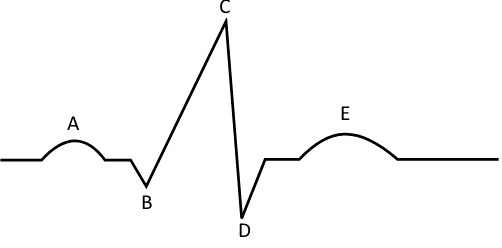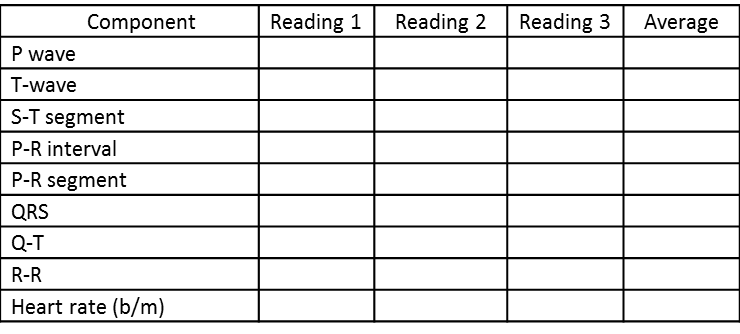Activity 1. Components of an ECG
-
- For the EKG wave above, label the letters shown above and give the heart activity taking place.
Name Hear Activity
-
- A. __________ ____________________________
- B. __________ ____________________________
- C. __________ ____________________________
- D. _________ ____________________________
- E. __________ ____________________________

- Using vertical lines show the following segments and intervals and indicate the heart activity taking place for each. If any is not on the diagram, write NA.
A. P-R interval _________________________
B. P-R segment _________________________
C. QRS complex _________________________
D. S-T segment _________________________
E. S-T interval _________________________
F. R-R interval _________________________
G. Q-T interval _________________________
3. What does each of the following distances indicate of time (sec) and heart rate (bpm)?
Time(sec) Heart rate (BPM)
A. One small square ______________ _______________
B. 5 small squares ______________ ________________
C. One large square ______________ ________________
D. 4 large squares ______________ ________________
E. 5 large squares ______________ ________________
F. 15 large squares ______________ ________________
Activity 2 – Interpreting an ECG
Using the above ECG, give the following measurements for each of the following. Indicate if each one is in the normal range.
Calculate the heart rate, asuming this EKG is regular.
Activity 3 – EKG Measurements at Various Time Points
ECG can be measured using either the LapQuest 2 handheld device or the regular EKG instrument. (If using the LabQuest2 follow the instructions given.)
1. Recording Baseline Readings
1. Take an EKG of everyone in your group.
2. Select who will be the experimental subject is.
3. Take an average of three separate readings. Use a ruler to measure the various regions.
- Effect of standing
Repeat the measurements with the test subject standing.
 What are the effects of standing on each of the above?
What are the effects of standing on each of the above?
3. Effect of exercise
Repeat the measurements after the test subject has exercised for 3 minutes. Be sure to have the electrodes in place so as to connect the leads as soon as the person is done exercising
What are the effects of exercise on each of the above? Summarize your results in a paragraph form.
Repeat the measurement after 5 minutes of rest.
What was the overall effect of resting on the above readings?





